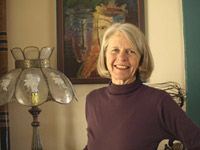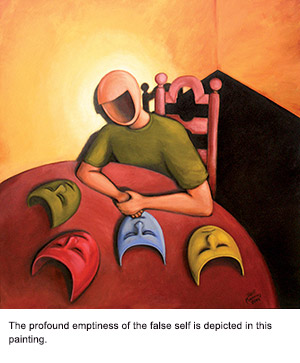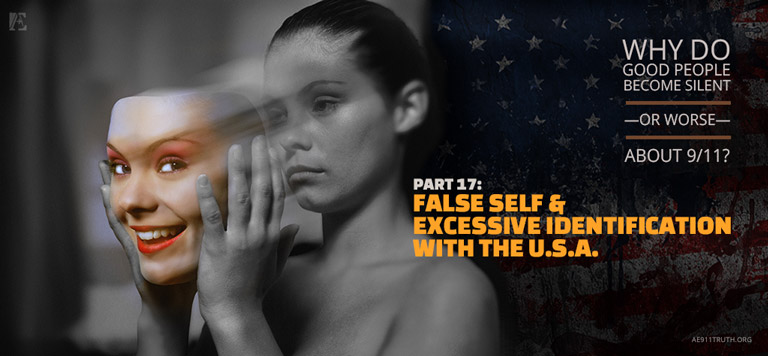Editor's Note: Frances Shure, M.A., L.P.C., has performed an in-depth analysis addressing a key issue of our time: "Why Do Good People Become Silent — or Worse — About 9/11?" The resulting essay, being presented here as a series, is a synthesis of both academic research and clinical observations.

Please note that because Architects & Engineers for 9/11 Truth is dedicated to researching and disseminating scientific information about the destruction of three World Trade Center skyscrapers on September 11, 2001, and does not speculate as to the identity or motives of the perpetrators, any reference to names or motives of the attackers in this series of articles, made by either the author or the individuals she quotes, is a personal opinion and not the viewpoint of AE911Truth.
Some citizens cannot separate themselves from their image of their nation. Certain American citizens, for example, seem incapable of distinguishing between themselves and the image of the United States of America. To criticize the nation and its government is to criticize them. If America is bad, then they, by extension, are bad and feel shame. If America is good, then they are good and can function more effectively. These individuals exhibit no autonomy, no separation from the image of our nation.
 Through the lens of psychodynamic psychology, we learn that this extreme attachment to the image of one’s country is a consequence of having never developed a healthy ego or sense of self,1 a condition that begins early in life, often as early as infancy. When parents are not able to meet an infant’s or child’s psychological needs, including the basic need of being recognized and loved for who she fundamentally is, the child becomes alienated from her true self and unable to complete the developmental task of achieving autonomy from her parents. She develops, instead, a “false self,” an identity dependent on her parents’ requirements of her. The process of individuation is arrested.2
Through the lens of psychodynamic psychology, we learn that this extreme attachment to the image of one’s country is a consequence of having never developed a healthy ego or sense of self,1 a condition that begins early in life, often as early as infancy. When parents are not able to meet an infant’s or child’s psychological needs, including the basic need of being recognized and loved for who she fundamentally is, the child becomes alienated from her true self and unable to complete the developmental task of achieving autonomy from her parents. She develops, instead, a “false self,” an identity dependent on her parents’ requirements of her. The process of individuation is arrested.2
All of us develop a social face, a public persona we present in order to function smoothly in society. And all of us reside on a continuum somewhere between a fully authentic self and a completely false self. At the former end of this continuum are individuals who are “real,” in that their feelings, beliefs, and actions are largely coherent. If they are also grounded in compassion and love, the peace of their deep authenticity and presence can often be felt by others. At the latter end of this continuum are those poor souls who know and exhibit only a false self. Sadly, they are not only unaware of how lost and lonely they are, but they may not have any idea of what an autonomous and individuated self might feel or look like.
As a child, this person has been trained to look to her parents, or at times to other close family members, to define who she is. As an adult, she transfers this dependence for identity to additional extrinsic sources: a partner, friends, children, objects, career, organizations, causes, political party, and even her nation. She may appear strong and self-assured, but underneath this image, she is actually emotionally fragile and profoundly empty. Her image, or false self, therefore, becomes crucially important. She defends this false self at all costs, because it is who she is, as far as she is able to discern.
The false self can manifest in a wide variety of forms. Depending on the narcissistic needs of the parents and other family members, the child may identify herself as smart, shrewd, dumb, strong, weak, compassionate, or define herself as an athlete, a scholar, a warrior, or a victim. Though she initially created this false self to adapt to her dysfunctional family, eventually she loses touch with her real feelings and becomes dysfunctional herself. The persona she develops largely depends on the identity that her parents projected onto her to maintain an illusory status quo — a sense of family stability and normalcy.
The person’s image or persona becomes a defense against the psychological pain of never having been recognized and accepted as one’s true self. The false self also becomes an inflexible lens, or filter, through which the person views and judges others, often harshly. If a person’s false self includes identification with America as a country of unequivocal goodness, then to be exposed to information suggesting that America is in fact an imperialistic aggressor, whose government is involved in violent State Crimes Against Democracy (see Part 13),3 is to have one’s self-image seriously challenged.
The evidence demonstrating that the official account of 9/11 is untrue threatens those who have excessively identified with what they perceive to be the indisputable goodness of the U.S.A. Such people may never be able to accept new information about 9/11, no matter how convincing, even irrefutable, the evidence. Their image, or false self, simply cannot be challenged, because their image is all they have. Underneath this image lies nearly unbearable psychological pain. Extreme anger and judgmental ad hominem attacks toward 9/11 skeptics are ways in which they may attempt to keep their worldview intact and to defend themselves against the fear of psychological deterioration.
We should leave these people alone. Thankfully, our country is filled with citizens who are psychologically willing to receive that seed of 9/11 Truth, and who will plant it and allow it to grow and change their lives, albeit sometimes very slowly.
While the person with a prominent false self may be incapable of questioning America’s goodness, most of us have been brought up to believe that America is at least “a fundamentally good nation . . . never deliberately doing anything terribly evil.”4 That “truth” has been drummed into us over the years, starting in the home and in church and school when we were children, and continuing in most social and business organizations to which we belong as adults. For the majority of Americans, this indoctrination has led us to believe that we are citizens of an exceptional nation, a belief that is called “American Exceptionalism.”
It is a sign of psychological health when we can hear information that challenges our belief in American exceptionalism, do our own research, and — if supported by the evidence — adjust how we view our nation accordingly. This is an ideal, mature state of mind for which we should all strive. It involves being open-minded and keenly discerning.
Nonetheless, even when abundant evidence proves that the image of our nation’s unequivocal goodness is a façade, some people adamantly refuse to modify their worldview. If such people also deem it a sacrilege to question the government’s account of 9/11 (or any other official account), then their belief in American exceptionalism can rightly be called “nationalist faith.” Paradoxically, among many Christians of this era, nationalist faith supersedes their faith in God. We will explore this subject in more detail in Part 18 of this essay.
Endnotes
1 The word “ego” is semantically confusing in the English language. For the purposes of this essay, a healthy ego or “sense of self” refers to a person who is aware of and accepts what she feels, thinks, and needs, and who is capable of acting constructively to meet her needs. She accepts herself as she is, without feeling the need to put up a false front. Generally speaking, such a healthy ego develops when a primary caretaker (usually the mother) recognizes and accepts a child's feelings and meets her needs throughout all of the developmental stages of infancy and childhood.
A “false self” is defined in this essay as the identity that evolves when the natural development of a healthy ego, or self, is frustrated. We all fall somewhere on a continuum from a healthy ego or self to the totally false self, depending on the developmental stage at which our need for acceptance was frustrated as well as the severity of that frustration.
When we hear the statement “she has a big ego,” this really means the person has a prominent false self. Stephen M. Johnson explains this false self in the first chapter of Characterological Transformation. Alice Miller renders a poetic description of the false self, which she describes as “grandiosity,” in The Drama of the Gifted Child.
According to the mystics of all religions, some Eastern spiritual traditions, and advocates of the “perennial philosophy,” an ego — even a healthy one — is understood as an illusion or false self, since, in their view, the true identity of everyone and everything is Oneness with the Absolute.
2 Tian Dayton, “Creating a False Self: Learning to Live a Lie,” updated 11/17/2011, Huffington Post (accessed Feb. 15, 2015). See http://www.huffingtonpost.com/dr-tian-dayton/creating-a-false-self-lea_b_269096.html. This article explains why and how a false self is developed.
3 Lance deHaven-Smith, “Beyond Conspiracy Theory: Patterns of High Crime in American Government,” American Behavioral Scientist 53, no. 6 (February 2010) 795–825. This entire issue is devoted to research on State Crimes Against Democracy.
4 David Ray Griffin, “9/11 and Nationalist Faith: How Faith Can Be Illuminating or Blinding.” See at http://davidraygriffin.com/lectures/911-and-nationalist-faith.
Note: Electronic sources in the endnotes have been archived. If they can no longer be found by a search on the Internet, readers desiring a copy may contact Frances Shure for a copy [ This email address is being protected from spambots. You need JavaScript enabled to view it. ].


